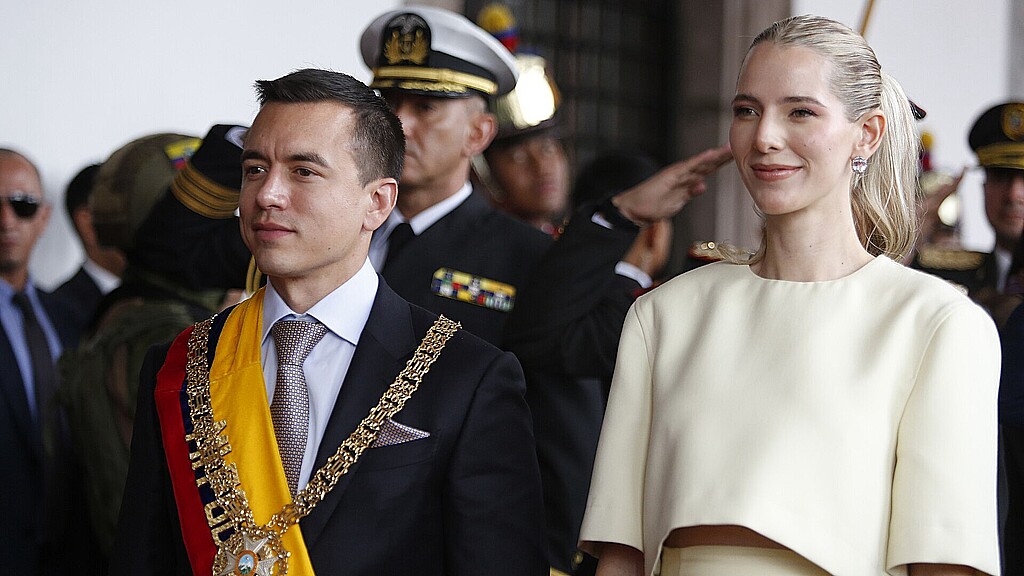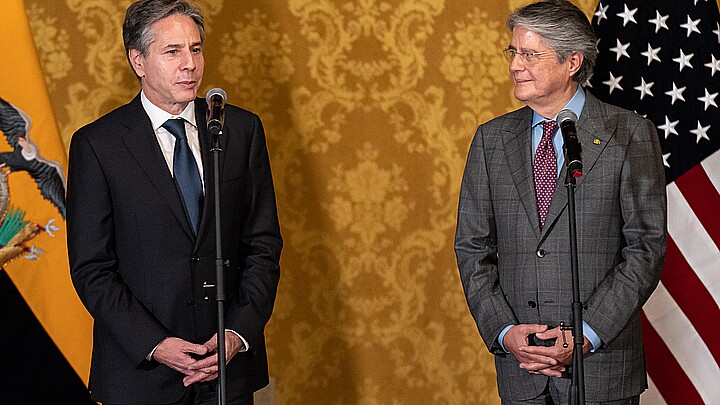Opinion & Reviews
Profile in Courage: Ecuadorians rally behind President Daniel Noboa's war on drug cartels and gangs
The South American nation is fighting against 50,000 cartel and gang members with a police force 58,000 strong

January 18, 2024 10:17am
Updated: January 18, 2024 10:17am
The term “war on crime” took on a new dimension in Ecuador. There are actually boots on the ground. The local army has been deployed, not against a foreign army but to combat organized crime. The South American nation is fighting against 50,000 cartel and gang members with a police force 58,000 strong. This made the intervention of the armed forces necessary to defeat a common enemy.
His decision comes in the wake of a wave of assassinations against Ecuadorian mayors and anti-crime crusader and journalist turned presidential candidate Fernando Villavicencio. The crime in Ecuador became so dangerous, last year that its previous president, Lasso Guillermo relinquished power just so he could invoke a special constitutional provision that allowed the government to enact emergency measures.
The U.S. has also joined forces with the country’s national law enforcement apparatus to collaborate in transnational criminal investigations and help track down Villavicencio’s assassins, whom are reportedly linked to the gangs and cartels.
Ecuador’s newly elected president, Daniel Noboa, has declared an “internal armed conflict.” This involves an executive order that allows the armed forces to intervene and neutralize organized crime groups.
By means of a video, the president announced that the armed forces have political support. He called on the population to show the men in uniform that they are appreciated. Each time soldiers enter a city or shop, they are praised. Which means they also count on the nation.
From rounds of applause to shopkeepers giving them supplies, are a common scene. One of the most moving situations was a street vendor giving soldiers ice-cream. Even stray dogs joining soldiers by helping them to arrest cartel members.
The nation claims for peace by means of a war on crime. There is only a small minority that is against it: progressives. The far left is claiming human rights abuses, including Amnesty International. However the population protests such claims pointing out the fact that Ecuador has become the most dangerous country in the region; especially when it comes to murder: 45 homicides per 100,000 inhabitants.
This is a surprise to many, considering that Ecuador was an “oasis of peace” for so many years.
It was a peaceful nation between two neighboring countries at way. In the south, Peru fighting against the Marxist guerrilla “Sendero Luminoso” and in the north, Colombia struggling in the longest civil war of the Americas against guerrilla groups involved in drug smuggling. As a result, Ecuador became the country with the highest percentage of refugees.
Now the tables have turned.
The political left has tried to use this situation as propaganda in favor of their regimes. They claim that under socialism Ecuador was a peaceful nation. What they don’t say is that for an entire decade the Ecuadorian government put gang members and guerrilla fighters in positions of power. One even became a legislator. To top it off, former president Rafael Correa rebranded gangs into “social organizations”.
Just a month before leaving his decade-long reign, he signed a presidential pardon in favor of 3,000 drug cartel members and overlords. He signed in April, left on May 24 and several cartel members were released by early June.
Those who claim that there was peace under the socialist regime ignore the fact that their leader released criminals, which destabilized his successors’ governments. The first in line was Lenin Moreno. He was Correa’s first vice-president. Therefore the claim that Ecuador has been governed by the political right once Correa left office is incorrect. However, Moreno did turn his back on Correa once in power. The quarrel among them literally destroyed their party. The building was even bulldozed.
During Moreno’s government Ecuador was the starting point for what Nicolas Maduro called “Bolivarian breezes.”
In October 2019, Chile, Ecuador, and Colombia were set ablaze, literally. The total destruction in Ecuador was worth over 800 million U.S. dollars. While the U.S. was in uproar amidst protests by BLM movements, South America underwent a similar situation but claiming indigenous rights instead. In Chile and Colombia it was even worse, it went on for weeks. Churches were destroyed, monuments and statues were toppled down. From then on, Ecuador has become the lab for insurrection movements. So it’s up to Ecuador now to end the violence before it propagates.
“What you see today is the reaction to that decision”
According to the Ecuadorian vice minister of government, Esteban Torres Cobo, “President Daniel Noboa made the historic decision to definitively solve the terrible structural problems that have kept the homeland in lethargy, in the first month of government. In the first month. Others preferred not to do so out of comfort, fear, or complicity.”
“What you see today is the reaction to that decision,” he added. This includes the government of former president Guillermo Lasso who did not end his term. In fact, Noboa is completing it over the next year and a half. It was under Lasso’s government that Ecuador suffered the worst surge of violence within prisons. More than 450 people were killed during mutinies. Some cases even included severed limbs.
That situation exposed Ecuador’s number one problem as regards justice: judicial activism. Lawyers, judges, and local attorney generals with progressive inclinations have been an impediment when it comes to locking up criminals and combating violence within prisons.
In fact, the European Union has pressured Ecuador in that matter. Which exposes another subject on its own. The globalist agenda breaches sovereignty. And in the case of poor nations that seek, as in the case of Ecuador, a visa exemption, such reforms are required. Small nations have the double pressure of addressing their own problems plus resisting agendas that inhibit them from acting.
While the EU asks Ecuador to respect the Human Rights of prisoners, two cartel leaders have escaped prisons. One of them offered to turn himself in and asked the president to guarantee protection. But Noboa responded that he would not negotiate with terrorists. Daniel Noboa is the youngest president in the Americas. He was elected at age 35 and began his government at 36. And he uses his youth as a source of stamina and has proven to not be pushed back.
The question now is if president Noboa has the determination, skills, and resources to put an end to this war. So far, he has received offers from the U.S. to send intel. Argentina even offered to send soldiers yet is unlikely due its austerity policies. After an initial day of hostilities, the government has increasingly shown signs of controlling the situation.
Meanwhile the world is watching. Violence has put the country on the map, as well as its public displays of solidarity. One of the most endearing as a 15-year-old giving supplies to the Army and her birthday, in return they gave her a cake and sang to her. Common citizens are showing that they want peace and authorize the government to achieve it through war.








